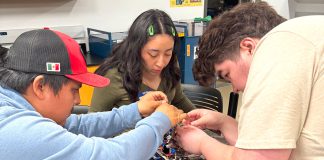Throughout the year, and especially during November, National Diabetes Month, Mee Memorial works to educate the community about diabetes prevention and management.
Diabetes starts when the body cannot properly regulate blood sugar levels. It is a health condition that impacts many individuals in South Monterey County and, if not managed appropriately, can result in serious complications such as heart disease, kidney damage, peripheral neuropathy (nerve pain) and vision loss.
While Type 1 diabetes cannot be prevented, Type 2 diabetes can often be delayed or prevented through lifestyle changes.
With Type 1 diabetes, the immune system attacks the insulin-producing cells in the pancreas, resulting in little to no insulin production. This type of diabetes usually develops during childhood or early adulthood and requires insulin therapy.
Both genetics and environmental factors play a strong role in the development of Type 2 diabetes. Our “environment” includes lifestyle choices such as a poor diet and inadequate physical inactivity. Our bodies become resistant to insulin and cannot produce enough insulin to maintain normal blood glucose levels. This type of diabetes can generally be managed through lifestyle changes and medications.
Keeping blood sugar levels stable is critical for effective diabetes management. The main factors that impact blood sugar levels are diet, physical activity, stress, and medication.
A balanced diet should include whole grains, lean protein, healthy fat, and a wide variety of colorful, fresh fruits and vegetables. Eating smaller portions more frequently throughout the day can help stabilize glucose levels. Carbohydrate tracking, particularly for people with Type 1 diabetes, helps control blood sugar spikes. Choose complex carbohydrates, such as legumes (beans, garbanzo beans, lentils, etc.) and whole grains over simple sugars, as this can prevent sharp increases in blood sugar.
Cook healthy, flavorful meals at home to reduce processed foods, and remember to stop eating when you are full. Stay well hydrated, but avoid sugary drinks — choose water instead! Diet and zero-sugar beverages mean that the flavor is sweet, but it does not raise blood sugar.
Exercise is a great way to manage blood sugar levels. Aim for at least 30 minutes of moderate cardiovascular exercise a day. Walking, dancing, swimming, cycling, and strength training are all excellent choices.
Stress and poor sleep can have a negative impact on blood sugar levels. Try a few stress management techniques to see what works for you. Deep breathing, yoga, meditation, and regular physical activity can all be beneficial. Aim for 7-9 hours of sleep per night to ensure that you are getting enough rest.
Don’t ignore your health. Regular medical check-ups are important. See your doctor if you experience symptoms of diabetes, such as extreme hunger or thirst, frequent urination, unusual fatigue, unintended weight loss, or blurred vision. Early intervention can prevent or delay progression. If you or a loved one are concerned about diabetes, reach out to your provider today to get the help and care you need.














